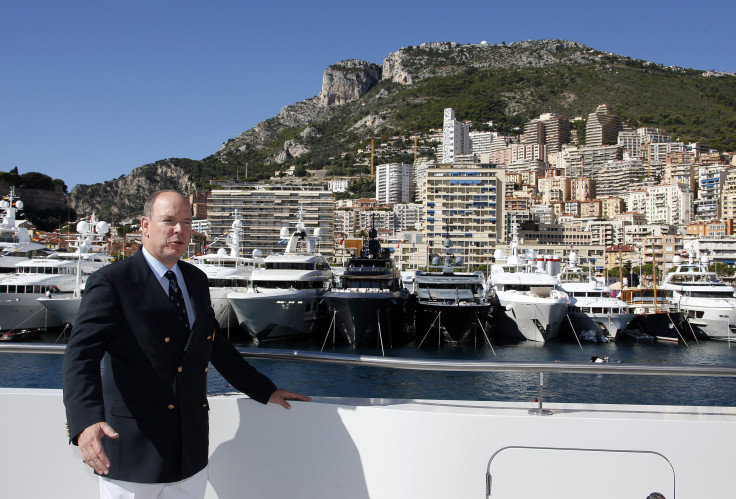The Bizarre, Fascinating World Of Monaco, The Wealthiest State On Earth

KEY POINTS
- Monaco has had no income tax since 1869
- About one-third of Monaco’s residents are millionaires
- All of Monaco could fit inside Central Park
As the global business and political elite prepare to meet in a pristine Alps resort in Switzerland next week, another place 330 miles to the south probably has more millionaires and billionaires per capita than even Davos will.
The tiny principality of Monaco, on the southern coast of France, has more super-wealthy residents per capita than anywhere else on the planet.
Occupying less than a square mile in diameter (smaller than Central Park in New York), Monaco has a population of approximately 38,000 – but about one-third of its residents are millionaires (versus one in 28 in London.) Moreover, about 2,800 of Monaco's residents are worth at least $10 million.
The Global Wealth Migration Review by AfrAsia Bank of Mauritius and New World Wealth, a global market research group, based in Johannesburg, South Africa, stated that the average wealth (defined as net assets) of a person living in Monaco was about $2.114 million in 2018 – the highest such figure in the world. Liechtenstein came a distant second at $786,000, followed by Switzerland ($315,000) and Luxembourg ($300,000). The corresponding figure for the U.S. was $186,000.
Monaco also has no poverty.
Damyana Bakardzhieva, a professor of economics at the International University of Monaco, said if one used France’s definition of poverty – that is, those people living on an income below $1,100 per month – than Monaco would have a poverty rate of zero.
A “country” this unique has many strange qualities. For example, Monaco is a constitutional monarchy run by the House of Grimaldi – the oldest dynasty in Europe -- and has been recognized as a sovereign state since 1861.
The natives of Monaco, called Monegasque, are vastly outnumbered in their own country, accounting for less than 25% of the population. The remainder comprise foreign residents primarily from France, Italy, U.K., Switzerland, Germany, Russia, and the U.S.
Citizens are forbidden from gambling or even entering their luxurious casinos.
Monaco has four casinos -- Casino de Monte Carlo, Casino Café de Paris, Sun Casino and Monte-Carlo Bay Casino -- all of which are operated by the Société des Bains de Mer, or SBM, a publicly traded company. For the 2017-2018 period, SBM reported revenues of $223 million.
Monaco also provides free health care and free education to its citizens and even housing subsidies to qualified applicants.
But even Monaco has certain problems familiar to other nations – as a very densely populated state (more than 49,000 people per square mile, versus 317 for France), it has a housing shortage.
To solve this, Monaco is constructing new luxury beachfront homes and boutiques through a land reclamation project set to cost $2.23 billion. Due for completion next year, the construction will comprise about 646,000 square feet of luxury accommodation, 33,000 square feet of retail space and a new private port.
Also, it’s very costly to live here.
Savills, the global real estate firm, stated that Monaco boasts the most expensive prime residential market on the planet. In 2018, its prime residential values were 10% higher than in Hong Kong, 96% higher than New York, 176% higher than London and 237% higher than Paris.
Monaco’s average price per square mile surged by 18.1% in 2018 to $5,028 per square foot while the average price growth in the world’s leading prime city housing markets was a sluggish 2.3%.
Monaco is also the most expensive market for prime rental property. In December 2018, the average rental value amounted to about $124 per square foot -- versus less than half that figure in London.
Not surprisingly, many who work in Monaco in “ordinary” jobs cannot afford to live in the principality and commute daily from France or Italy.
Monaco is widely renowned as a tax haven – one of the many reasons it attracts so many high net worth individuals.
Monaco residents pay no income tax because in 1869 the Grand Casino de Monte Carlo was so successful the government decided to cease collecting income tax. Monaco also does not charge capital gains tax nor a wealth tax.
However, Monaco is not entirely tax free.
French citizens who reside in Monaco are subject to personal income tax based on French laws and which are paid directly to the French government.
While there are no property taxes in Monaco, rental properties are taxed at a rate of 1% of the annual rent plus other applicable charges. When property is sold, the seller is hit with a 33.3% tax on profits.
Also, while there is no general corporate income tax in Monaco, certain businesses have to pay taxes on profits – for example, companies that have 25% or more of their operations outside of Monaco.
Belying its fairy tale image, Monaco has a heavy and highly visible police presence.
There is one police officer for every 74 residents, while more than 560 CCTV cameras monitor every corner of the country 24 hours a day.
"Monaco has the highest density of police per capita in Europe by far," said Hans Muhlbacher, research director at International University of Monaco. "There are observation cameras well-hidden to tourists and visitors all over the principality."
Former ruler Prince Rainier once declared: "Monaco must have total security.” Monaco police officers have to undergo a strict 2-year training program.
As a consequence. Monaco is virtually free of crime. The tiny state averages about one homicide per decade.
Perhaps the most high-profile murder to occur in recent times was when billionaire banker Edmond Safra, a personal friend of Prince Rainier, was found dead in his heavily fortified Monte Carlo apartment in 1999.
© Copyright IBTimes 2025. All rights reserved.





















